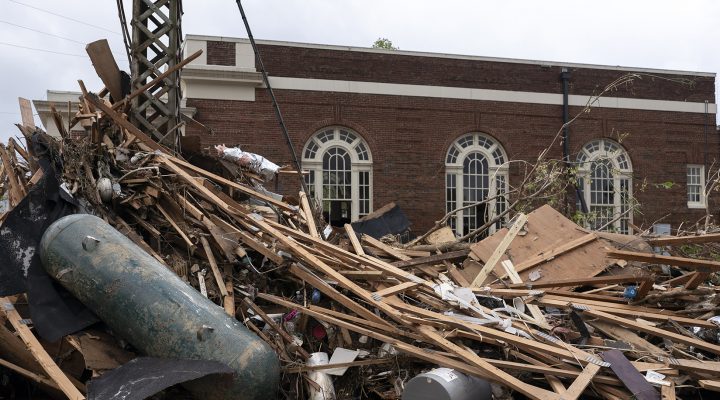People and institutions of faith from Florida to North Carolina are kicking into high gear to help the victims of Hurricane Helene even as they struggle assessing the human need and the scope of physical damage.
Even in the most isolated of communities, ministers and congregations capable of doing so already are serving neighbors in the aftermath of the storm, said Larry Hovis, executive coordinator of the Cooperative Baptist Fellowship of North Carolina.
“Churches immediately move into ‘how can we serve?’ using whatever physical and other resources they have to be the hands and feet of Jesus in very practical ways, and that is happening all over,” he said.
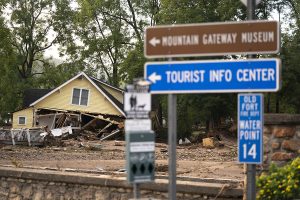
A storm damaged house sits in ruins near a sign for the Mountain Gateway Museum in the aftermath of Hurricane Helene on September 30, 2024 in Old Fort, North Carolina. (Photo by Sean Rayford/Getty Images)
Helene tore a path of destruction from the Big Bend area of Florida, where it made landfall Sept. 26 as a Category 4 hurricane, on through parts of Georgia, East Tennessee, South and North Carolina and Virginia. At least 119 people were killed in the storm that brought massive flooding and wind damage to stunned urban and rural areas throughout the six states. Western North Carolina, and Asheville in particular, sustained a “tremendous amount of wreckage,” a city fire official said.
Four days after the storm, Hovis said his only communication with a CBFNC-affiliated congregation in Asheville was a brief message from someone at First Baptist Church. “They were just getting communications back.”
In fact, it’s been an uphill slog contacting congregations throughout most of Western North Carolina, he added. “We have spent [the] last three days reaching out to pastors and other church leaders in the affected areas. Some we reached quickly, some took several days because communication networks are out, and a few others we still have not heard from because cell service has not been restored in every area.”
It’s been a similar situation in South Carolina where many CBF partner churches have been unreachable even as of Sept. 30, said Elizabeth Nance-Coker, coordinator of CBFSC.
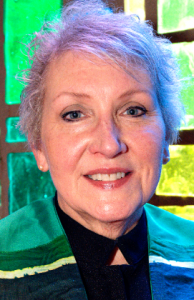
Elizabeth Nance-Coker
“Many of our upstate communities and churches are hard hit and are still in the first responder stage — power lines and trees are down, there is no power grid up and running yet, and gasoline is in short supply. The majority of our churches have no power, so very few were able to meet (for worship) yesterday. Many people cannot get out of their neighborhoods. Cell networks are iffy at best.”

Tammy Snyder
Tammy Snyder, coordinator of CBF Florida, said Bayshore Baptist Church in Tampa and First Baptist in St. Petersburg reported having multiple families displaced by the hurricane, while CBF Disaster Response Coordinator Kenny Phillips is visiting the Big Bend area to assess the damage in those communities.
Phillips also connected CBF Florida with a Church of God congregation willing to let fellowship volunteers stage disaster relief operations from its property, she said. “In the meantime, the shower trailer is being relocated to this area and getting ready for the teams when they begin to arrive. According to Kenny Phillips, ‘We will need hands-on labor. Debris removal, light construction and muck out assistance will be some of the tasks at hand.’”
Many congregations and individuals in and around the affected areas were quick getting into disaster relief mode just hours after the storm had passed. Some launched whatever feeding and water distribution services they could while others served as information hubs for outsiders wanting to help and for isolated local residents.
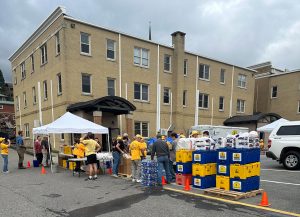
North Carolina Baptists on Mission feeding site at First Baptist Church of Boone, N.C. (via Facebook)
First Baptist Church of Hendersonville, N.C., “needs donations right now … water, food, hygiene products,” Winston-Salem resident and Hendersonville native Linda M. Bridges, a founding faculty member of Baptist Theological Seminary at Richmond, declared on Facebook following the storm. Her feed has been replete with videos, photos and words intended to share practical information and hope with Helene’s victims and their helpers.
“Distribution center at the Tuxedo Park. Thank you, everyone. Help is on the way. Deep peace and strength to all, dear hearts and gentle people of my hometown,” Bridges said in one post.
Another series of her posts included a Sept. 30 video featuring Justin Alexander, senior pastor of First Baptist Hendersonville, describing the church’s feeding operations. “The lines were so long here at First Baptist we have already run out of every bit of food that we have, every bit of the hygiene products we had to give out. We’re basically now giving out water and ramen noodles. That’s the only thing we have left.”
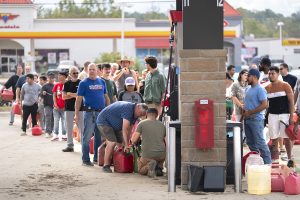
People wait on others to pump gasoline in the aftermath of Hurricane Helene on September 29, 2024, in Fletcher, N.C. (Photo by Sean Rayford/Getty Images)
Ardmore Baptist Church in Winton-Salem posted a message expressing amazement at how many of its members signed up to serve on disaster relief teams. “We look forward to the ways we as a community can help support Western North Carolina!”
First Baptist Church in Pendleton, S.C., used social media during and after the weekend to share local school closures and to invite residents to charge cell phones at its facility. Other posts served to inform the outside world about local conditions. “Friends, we hope everyone has safely weathered Hurricane Helene! As of Friday evening, there are still many trees and power lines down, driveways and neighborhoods blocked, and almost everyone is without power.”
In announcing cancellation of its Sunday worship, the church also posted the Psalm that was to be read that morning, pointing especially to its declaration that without God’s presence “the flood would have engulfed us, the torrent would have swept over us, the raging waters would have swept us away.”
“As we read Psalm 124 in the aftermath of Hurricane Helene, scattered in our own homes rather than gathered for worship, many still without power, in the midst of uncertainty and waiting, facing a long road of recovery and rebuilding, may we experience a sense of God’s holy presence,” the announcement said. ”God is still with us, in the storms and after the storms, wherever and however we find ourselves this Sunday morning.”
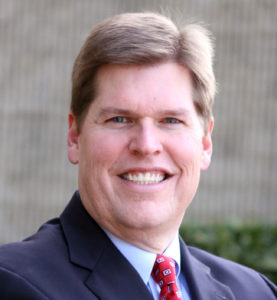
Larry Hovis
Hovis added Mars Hill Baptist Church has spent nearly two full days feeding first responders and others in need, and First Baptist Church West Jefferson established a water and food distribution in its community. CBFNC plans to deliver disaster relief buckets to both congregations in the coming days.
In many cases, those serving their neighbors are facing their own hardships, he said. “I have not discovered a pastor with significant home damage, although plenty of church members in plenty of places have had a lot of damage. We have not discovered church buildings with significant damage, but some have experienced minor flooding.”
CBFNC is encouraging people to volunteer with North Carolina Baptist on Mission, formerly known as North Carolina Baptist Men. The ministry already has launched feeding and recovery operations in Boone and several other locations.
Nance-Coker said CBFSC is working with CBF Disaster Response to determine when and where to send aid: “I am contacting pastors again today, ready to receive their assessments so that we can move forward into relief as soon as first responders clear the areas. We have flood cleanup buckets stored and ready to distribute when roads are clear.”
The Alliance of Baptists encouraged support for its partner congregations in Western North Carolina, including Circle of Mercy, Cullowhee Baptist, First Baptist Asheville, and Mars Hill Baptist. “We’ve been in contact with those we can reach in Western North Carolina over the weekend, and we’ve heard a common refrain from them all: it’s going to be a long rebuilding process after the destructive flooding from Helene.”
Meanwhile, CBF Disaster Relief is gearing for disaster relief as needs become evident, said CBF Executive Coordinator Paul Baxley. He also requested contributions for disaster response.
“In large cities and small towns from the Florida panhandle up through Western North Carolina, Eastern Tennessee and Southwest Virginia, there is extensive damage from high winds and the flooding unleashed by torrential rains. Roads are impassible, homes, businesses and church buildings have been damaged and destroyed.”

